Introduction: The Growing Fascination with Mushrooms and Cancer Prevention
In recent years, the question “Can mushrooms help protect against cancer?” has transitioned from alternative health forums into the mainstream scientific discourse. As interest in natural health interventions expands, more individuals are seeking evidence-based information about the potential of mushrooms in cancer prevention and therapy. This growing curiosity is fueled not only by promising preliminary research but also by the long-standing use of medicinal mushrooms in traditional healing systems around the world. Modern science is now rigorously exploring ancient wisdom, with numerous studies focusing on mushrooms for cancer, especially highlighting varieties like turkey tail and maitake. From groundbreaking turkey tail mushroom cancer studies to anecdotal turkey tail mushroom cancer testimonials, the conversation is robust and full of nuance. In this article, we will explore the science, myths, and realities surrounding cancer-fighting mushrooms, helping you understand their role, if any, in modern oncology.
You may also like: How Lion’s Mane Supplements May Support ADHD and Cognitive Clarity: What Science Says About Lions Mane for Focus and Brain Health
Mushrooms and Cancer: A Historical Perspective
Medicinal mushrooms have been revered for centuries across multiple cultures. Traditional Chinese Medicine, Ayurveda, and indigenous healing systems in North America have long utilized mushrooms for their purported immune-enhancing and disease-fighting properties. Before diving into the latest mushrooms cancer studies, it is important to appreciate how the therapeutic reputation of mushrooms evolved. The ancient use of mushrooms for cancer-like conditions underscores a rich ethnomedical history where mushrooms were classified as potent “elixirs of life.”
One of the most notable examples is the turkey tail mushroom, which has been used in Asia for centuries to strengthen the body’s defenses. While historical claims should not be accepted uncritically, the remarkable consistency of mushroom use across civilizations suggests an intrinsic bioactivity that modern science is now beginning to validate. Today’s investigations into whether mushrooms cure cancer do not stand in isolation; they are deeply rooted in a global tradition of utilizing fungi for health and longevity.
Understanding How Mushrooms May Support Cancer Prevention and Therapy
Scientific inquiry into how mushrooms for cancer might work has revealed multiple pathways of potential therapeutic activity. First and foremost, many medicinal mushrooms are rich in beta-glucans, complex polysaccharides that modulate immune responses. These compounds enhance the activity of macrophages, natural killer (NK) cells, and T-lymphocytes, all of which play crucial roles in identifying and eliminating cancerous cells.
In addition to immunomodulation, anti-cancer mushrooms exhibit antioxidant properties that help neutralize free radicals, unstable molecules that can damage cellular DNA and initiate cancer development. Furthermore, some mushrooms contain compounds that inhibit angiogenesis—the formation of new blood vessels—a process that tumors exploit to secure a blood supply for their growth. Thus, when asking “Do mushrooms protect from cancer?”, the emerging answer is nuanced: they may not be a magic bullet, but their bioactive compounds exhibit multiple mechanisms that could support cancer prevention and therapy.
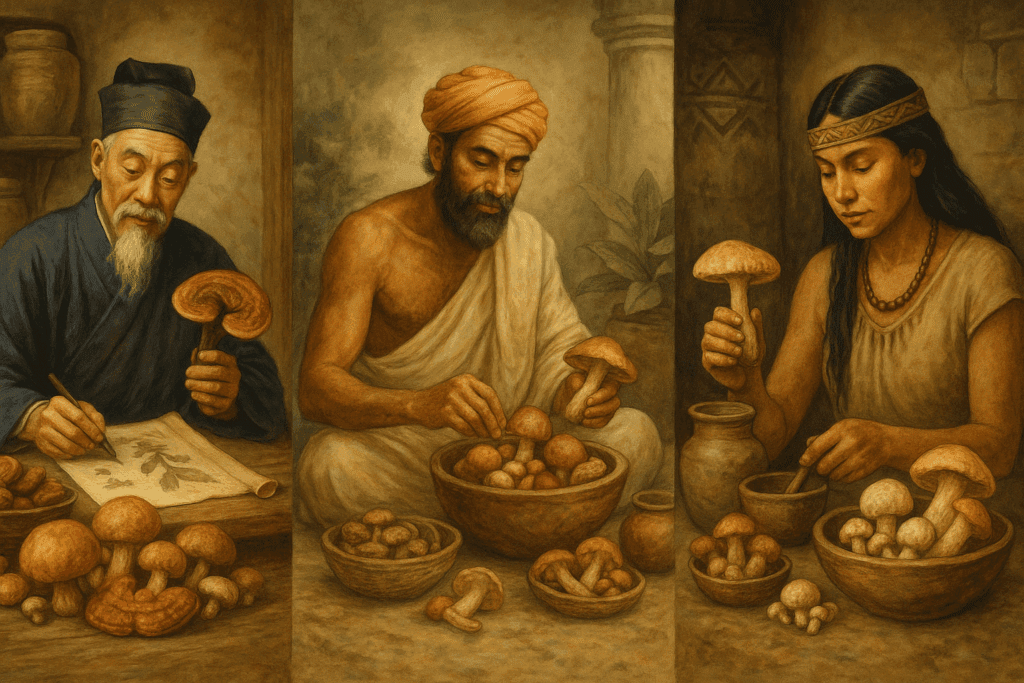
Turkey Tail Mushroom and Cancer: A Deep Dive
Turkey tail mushroom (Trametes versicolor) has captured the attention of both researchers and the public alike. Numerous turkey tail mushroom cancer studies suggest that this colorful fungus might offer real hope as an adjunct therapy for cancer patients. Turkey tail contains polysaccharide-K (PSK) and polysaccharide-P (PSP), compounds that have demonstrated immune-boosting and anti-tumor activities in preclinical and clinical studies.
One landmark turkey tail mushroom cancer study in Japan led to the approval of PSK as a complementary cancer therapy alongside conventional treatments like chemotherapy. Patients with gastric, colorectal, and lung cancers who supplemented with PSK showed improved survival rates compared to those who did not. Moreover, the link between turkey tail mushroom and breast cancer has been of particular interest, as emerging data suggest that it could help enhance immune recovery in breast cancer patients undergoing radiation and chemotherapy.
In the realm of anecdotal evidence, turkey tail mushroom cancer testimonials often speak of improved well-being, fewer side effects from chemotherapy, and enhanced energy levels. While such testimonials are inspiring, it is crucial to emphasize that scientific validation remains the gold standard. Nevertheless, the intersection of turkey tail cancer research and patient experience creates a compelling narrative that continues to spur further investigation.
Maitake Mushrooms and Cancer: The Overlooked Champion
While turkey tail often steals the spotlight, maitake mushrooms (Grifola frondosa) deserve serious consideration. Known colloquially as “hen of the woods,” maitake has demonstrated potent anti-cancer properties in laboratory studies. Research on maitake mushrooms and cancer has shown that their D-fraction, a unique beta-glucan complex, can activate immune cells and induce apoptosis (programmed cell death) in certain cancer cell lines.
Clinical studies on maitake and cancer suggest potential benefits for patients with breast, lung, and liver cancers. In one small human trial, maitake extract was associated with immune enhancement in breast cancer patients. These findings fuel optimism about mushroom therapy for cancer, particularly when it comes to integrating maitake into broader supportive care strategies.
Despite these promising results, it is critical to approach claims about maitake mushrooms and cancer with scientific caution. While laboratory results are exciting, large-scale human trials are necessary to substantiate their clinical efficacy. Nonetheless, maitake remains a top contender among the best mushrooms for cancer support, especially given its dual role in enhancing immune function and directly targeting tumor cells.
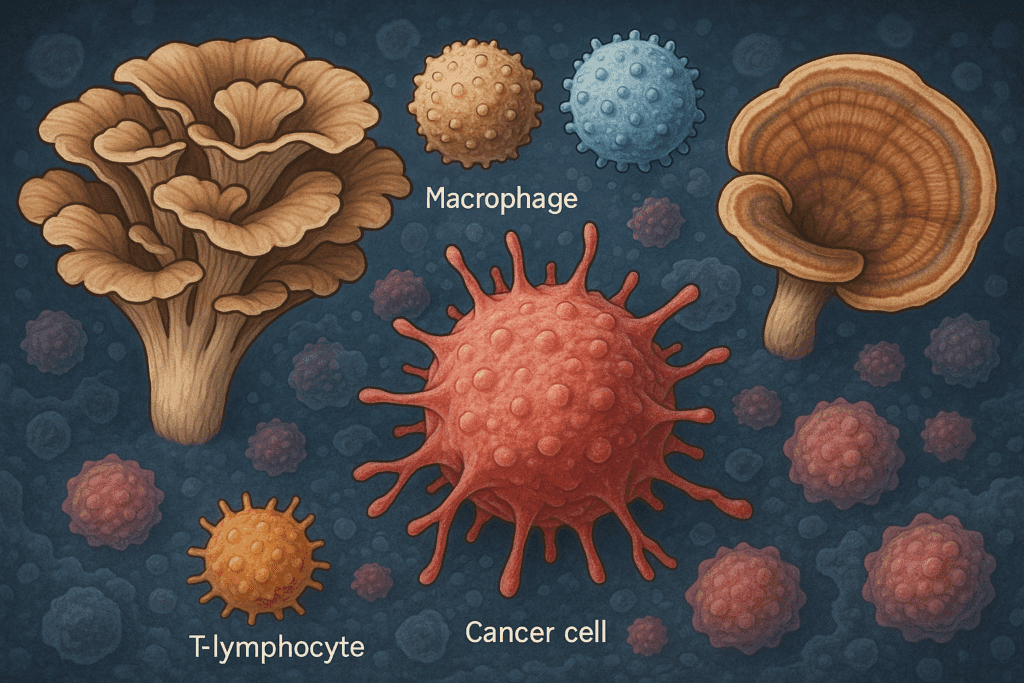
The Broader Landscape: Other Anti-Cancer Mushrooms Worth Watching
Beyond turkey tail and maitake, several other mushrooms exhibit properties that warrant exploration in the context of cancer therapy. Reishi (Ganoderma lucidum), shiitake (Lentinula edodes), and chaga (Inonotus obliquus) are often highlighted for their potential roles as cancer fighting mushrooms.
Reishi mushrooms contain triterpenoids and polysaccharides that exhibit anti-inflammatory and anti-tumor activities. Shiitake mushrooms, widely consumed as culinary delicacies, possess lentinan, a beta-glucan shown to stimulate immune responses against tumors. Chaga, often referred to as the “king of medicinal mushrooms,” is rich in antioxidants and has been investigated for its potential to inhibit cancer cell growth.
Mushroom supplements for cancer are becoming increasingly sophisticated, offering standardized extracts with guaranteed levels of active compounds. While more research is needed, these findings reinforce the notion that multiple fungi, not just turkey tail or maitake, could play supportive roles in cancer prevention and care.
Mushrooms and Breast Cancer: A Special Focus
Breast cancer remains one of the most common malignancies worldwide, and interest in mushrooms and breast cancer has surged accordingly. Studies exploring turkey tail mushroom and breast cancer have provided some encouraging preliminary findings. Researchers have observed that turkey tail supplementation may help restore immune function in women undergoing aggressive breast cancer treatments, potentially improving outcomes.
Moreover, investigations into other anti-cancer mushrooms suggest that maitake, reishi, and shiitake may offer adjunctive benefits for breast cancer patients. Their ability to modulate immune responses, enhance chemotherapy efficacy, and reduce treatment-related side effects makes them appealing candidates for further research.
However, it is vital to clarify that while mushrooms can offer supportive benefits, they should not replace conventional breast cancer treatments. The role of mushrooms for cancer treatment should be understood as complementary rather than alternative, enhancing standard therapies rather than supplanting them.
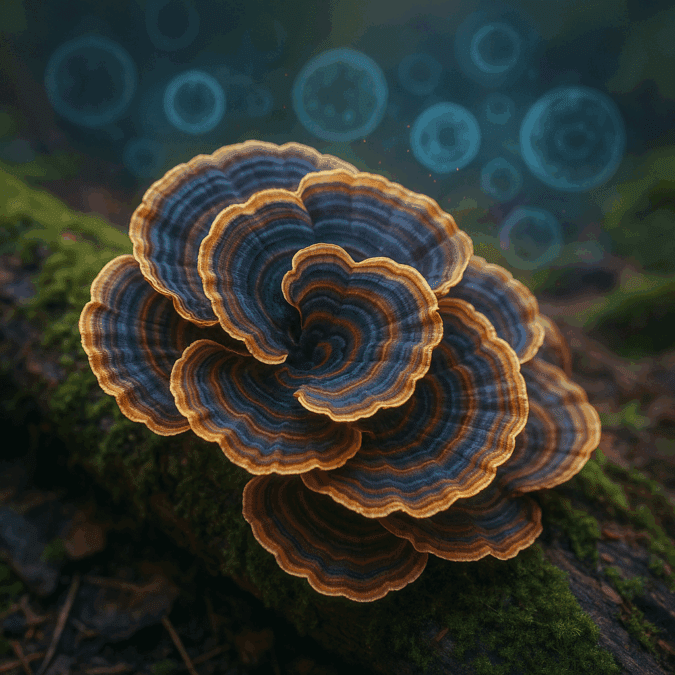
Understanding the Evidence: What the Science Says About Mushrooms Cancer Studies
A rigorous examination of mushrooms cancer studies reveals a mix of promising results and the need for further investigation. Animal studies have consistently shown that various mushroom extracts can inhibit tumor growth, stimulate immune function, and improve survival outcomes. However, translating these results to human populations is inherently complex.
Human clinical trials, though fewer in number, have yielded cautiously optimistic findings. Trials involving PSK from turkey tail and D-fraction from maitake have demonstrated improved immune markers and, in some cases, better survival statistics. Yet the variability in study designs, dosages, and mushroom preparation methods makes it challenging to draw definitive conclusions.
Therefore, when exploring whether mushrooms cure cancer, it is crucial to temper expectations with scientific rigor. While mushrooms undeniably possess biologically active compounds with anti-cancer properties, more robust, large-scale human studies are necessary to confirm these effects in clinical settings.
Practical Considerations: Can Cancer Patients Eat Mushrooms Safely?
One of the most frequently asked questions is “Can cancer patients eat mushrooms?” The answer is generally yes, provided they are consumed as part of a balanced, healthful diet. Fresh mushrooms, whether culinary or medicinal varieties, can offer nutritional benefits, including fiber, vitamins, minerals, and antioxidants.
For patients considering mushroom supplements for cancer, it is essential to consult with an oncologist or integrative medicine specialist. Certain mushroom extracts can interact with chemotherapy agents or immune therapies, potentially altering their effectiveness. Choosing the best turkey tail supplement for cancer, or any mushroom product, requires careful consideration of quality, purity, and dosage.
Moreover, immune-compromised patients must ensure that mushrooms are properly cooked or prepared to minimize the risk of foodborne illnesses. With appropriate precautions, mushrooms can be a nourishing and supportive addition to the diets of many cancer patients.
Choosing the Best Turkey Tail Supplement for Cancer Support
With the proliferation of mushroom supplements on the market, selecting the best turkey tail supplement for cancer can be daunting. Key factors to consider include the extraction method, standardization of active compounds (such as PSK and PSP), third-party testing for purity, and absence of contaminants like heavy metals or pesticides.
Hot water extraction is often considered the gold standard for turkey tail supplements, as it preserves the integrity of beta-glucans and other polysaccharides. Products that clearly state beta-glucan content and offer certificates of analysis provide additional layers of consumer confidence.
Cancer patients and health-conscious individuals alike should prioritize supplements manufactured under Good Manufacturing Practices (GMP) to ensure consistency, safety, and efficacy. Investing time in research can help consumers harness the full potential of turkey tail cancer support.
Mushroom Therapy for Cancer: Integrating Tradition with Modern Oncology
The concept of mushroom therapy for cancer blends ancient wisdom with modern scientific inquiry. Integrative oncology, a burgeoning field, seeks to combine evidence-based natural therapies with conventional cancer treatments to optimize patient outcomes.
Turkey tail, maitake, and other mushrooms represent promising adjuncts that may help mitigate treatment side effects, enhance immune resilience, and possibly improve survival rates. However, they should never be used as sole therapies. Collaborative care involving oncologists, integrative practitioners, and informed patients offers the most ethical and effective model for integrating mushroom therapy into cancer care.
Continued research, patient education, and clinical vigilance are crucial to ensuring that the use of mushrooms for cancer treatment remains grounded in science rather than speculation.
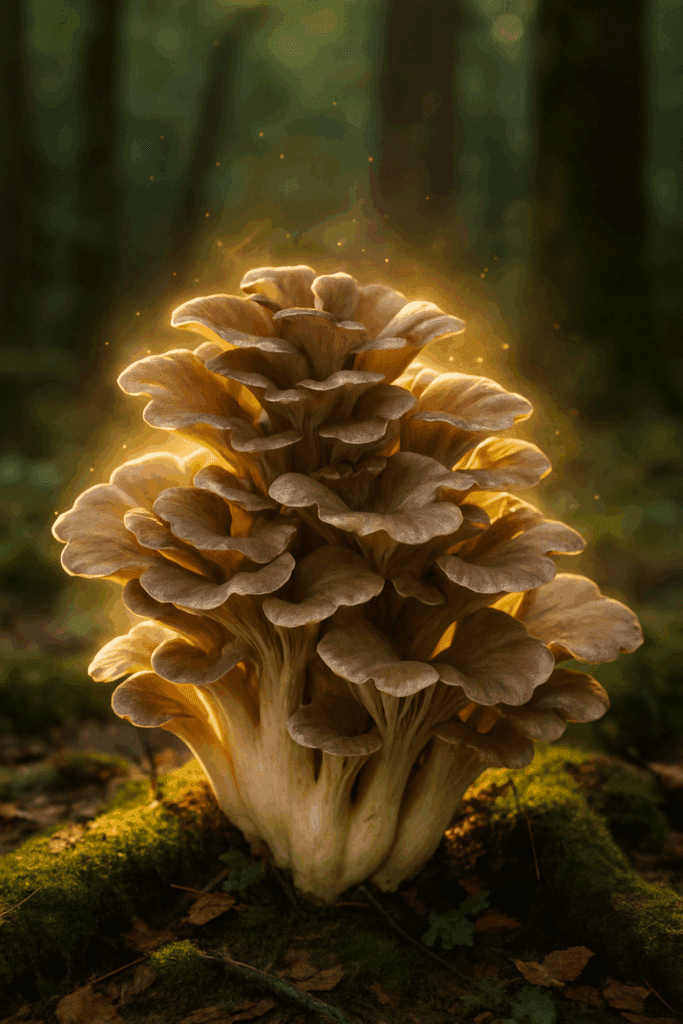
Frequently Asked Questions: Mushrooms and Cancer Support
1. Can mushrooms cure cancer or are they mainly supportive in treatment?
Despite the growing body of research around mushrooms for cancer, it is important to clarify that mushrooms do not cure cancer. Rather, they may provide supportive benefits when integrated into broader treatment plans. Studies such as the turkey tail mushroom cancer study have highlighted the role of immune enhancement and quality-of-life improvement rather than outright tumor eradication. The question “do mushrooms protect from cancer?” finds partial support in the evidence, particularly in prevention and adjunctive therapy contexts, but they are not standalone cures. Responsible use of anti cancer mushrooms should always be part of a comprehensive, medically supervised approach.
2. How reliable are turkey tail mushroom cancer testimonials when considering mushroom therapy?
Turkey tail mushroom cancer testimonials often offer inspiring accounts of resilience and recovery, but anecdotal evidence must be balanced with scientific scrutiny. Testimonials can shed light on the real-world experiences of those using mushrooms for cancer treatment, yet they do not replace the rigorous standards of clinical research. A single turkey tail mushroom and cancer experience may be influenced by numerous variables such as diet, genetics, and concurrent treatments. Emerging studies validate components of turkey tail cancer support, but decisions should be based on broader, peer-reviewed evidence rather than individual testimonials alone. Always consult healthcare providers when considering mushroom therapy for cancer.
3. Are there specific types of cancer where mushrooms show the most promise?
Research suggests that mushrooms such as turkey tail and maitake may show particular promise for breast, colorectal, and gastric cancers. The intersection of turkey tail mushroom and breast cancer has been especially well-studied, with some clinical trials reporting immune system recovery post-chemotherapy. Maitake mushrooms and cancer research have demonstrated apoptosis induction in breast and liver cancer cells in laboratory settings. However, each cancer type responds uniquely to interventions, and what may benefit one type may have little effect on another. For now, mushrooms cancer study results indicate the most promising benefits when combined with conventional treatments.
4. How do mushroom supplements for cancer differ from consuming fresh mushrooms?
Mushroom supplements for cancer are concentrated extracts, often standardized for specific compounds like beta-glucans or polysaccharide-K, whereas fresh mushrooms offer a broader, less concentrated nutrient profile. Supplements can deliver therapeutic doses that would be difficult to achieve through diet alone, a critical factor when considering best turkey tail supplement for cancer support. While eating fresh anti cancer mushrooms can contribute to overall health, targeted supplementation is often necessary for therapeutic effects. Nonetheless, not all supplements are created equal, and consumers should prioritize products that have undergone clinical validation and third-party testing. Mushroom therapy for cancer demands both quality and evidence-backed dosing strategies.
5. What factors determine the best mushrooms for cancer prevention and support?
Choosing the best mushrooms for cancer depends on a combination of bioactive content, extraction method, and clinical validation. Turkey tail mushroom and cancer research points to the importance of polysaccharide content, while maitake and cancer investigations emphasize D-fraction purity. Hot water extraction is typically preferred for preserving immune-enhancing compounds. Furthermore, emerging technologies like nanoparticle delivery are enhancing the bioavailability of mushroom supplements for cancer. A holistic evaluation of extraction technique, dosage, and independent certification ensures the best therapeutic outcomes from cancer fighting mushrooms.
6. Can cancer patients safely incorporate mushrooms into their daily nutrition plans?
The question “can cancer patient eat mushroom?” is usually met with a positive answer when approached with common sense and medical guidance. Fresh culinary mushrooms such as shiitake or maitake can contribute valuable antioxidants and fibers to the diet. However, immune-compromised patients must prioritize well-cooked mushrooms to minimize infection risks. Integrating mushrooms for cancer treatment nutritionally may offer gentle immune support and improved digestion, though it should never substitute for medically prescribed treatments. Discussing dietary changes with a healthcare team ensures the safe and effective incorporation of mushrooms and breast cancer supportive strategies.
7. What are the emerging trends in mushroom therapy for cancer?
Emerging trends in mushroom therapy for cancer include personalized supplementation based on genetic and immune profiling. Precision medicine approaches may soon tailor mushroom-based interventions to individual patient needs, optimizing the effects of turkey tail cancer or maitake-derived therapies. Advanced clinical trials now explore combining anti cancer mushrooms with immunotherapies to boost efficacy. Additionally, the use of mushroom-derived nanocomposites to deliver drugs directly to tumor cells represents an exciting frontier. As mushrooms cancer study initiatives grow, expect more sophisticated and individualized applications within integrative oncology frameworks.
8. How important is the source and quality of mushroom supplements in cancer support?
When selecting mushroom supplements for cancer, quality is paramount. Products backed by clinical research, such as those used in a turkey tail mushroom cancer study, provide more confidence than generic, untested brands. Look for labels indicating hot water extraction, verified beta-glucan content, and third-party laboratory certifications. The best turkey tail supplement for cancer will also be free from contaminants like heavy metals and pesticides. Choosing premium quality not only enhances potential therapeutic benefits but also safeguards patient safety, especially during vulnerable periods of cancer therapy.
9. What distinguishes maitake mushrooms and cancer research from other mushroom studies?
Maitake mushrooms and cancer research stand out due to their unique bioactive compounds like D-fraction, which demonstrates both immunomodulatory and direct anti-tumor effects. Unlike some other anti cancer mushrooms, maitake extracts have undergone early-stage human clinical trials showing promising immune enhancement in breast cancer patients. Studies differ by focusing not only on survival rates but also on patients’ quality of life, showcasing how maitake can reduce fatigue and bolster resilience during chemotherapy. While turkey tail mushroom and cancer research often emphasizes immune recovery, maitake’s role in apoptosis is an additional therapeutic angle. Future mushrooms cancer study initiatives may further clarify how these distinct mechanisms complement each other in integrated cancer care.
10. What future developments can we expect regarding mushrooms and breast cancer therapy?
Future research into mushrooms and breast cancer is poised to explore combination therapies where mushroom extracts enhance the effectiveness of conventional drugs. Investigators are studying how compounds from turkey tail mushroom and breast cancer pathways might amplify immune checkpoint inhibitors’ benefits. Advances in mushroom genomics could also allow scientists to selectively breed strains with superior anti-cancer properties. Mushroom supplements for cancer treatment may become more personalized, adjusting formulations to each patient’s specific tumor biology. As the field matures, mushrooms for cancer therapies may move from supportive roles to more integrated, co-therapeutic strategies within standard breast cancer protocols.
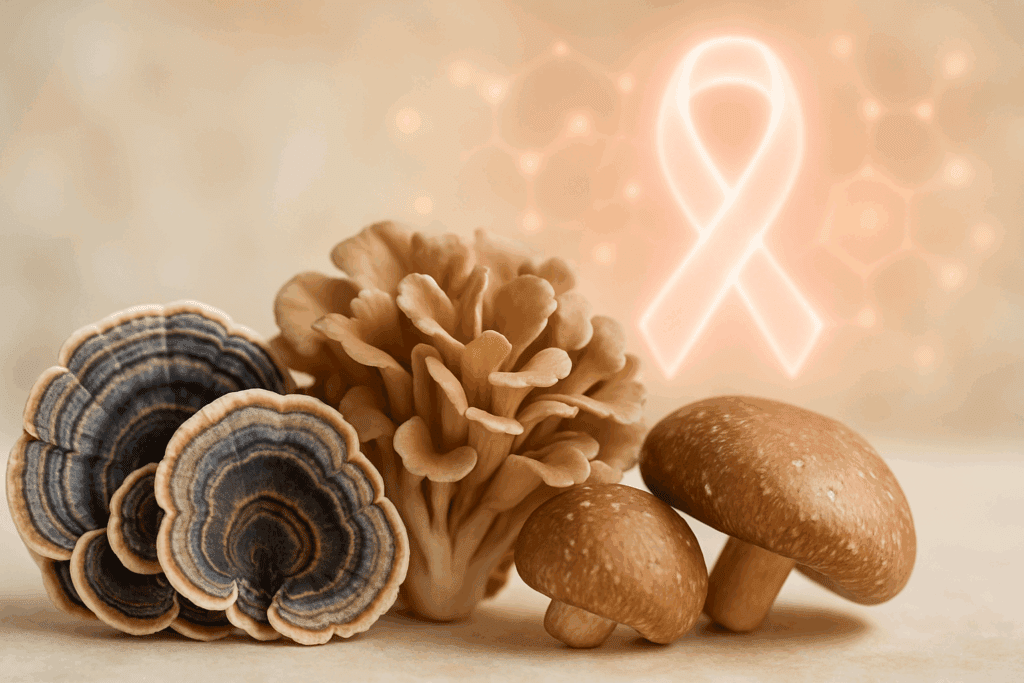
Conclusion: What the Emerging Science Tells Us About Anti-Cancer Mushrooms
The growing body of evidence suggests that while mushrooms may not outright cure cancer, they offer compelling supportive benefits that merit serious consideration. From the robust turkey tail mushroom cancer studies to the promising data on maitake mushrooms and cancer, fungi continue to impress researchers with their immunomodulatory and anti-tumor activities. As the scientific community conducts more rigorous mushrooms cancer studies, the potential for mushrooms to enhance conventional cancer therapies becomes increasingly plausible.
Whether exploring turkey tail mushroom and breast cancer connections, assessing the best turkey tail supplement for cancer support, or considering mushroom supplements for cancer prevention, it is vital to approach these natural therapies with both optimism and critical thinking. Mushrooms for cancer treatment represent a fascinating convergence of tradition and science, offering hope and healing for the future, but always within the framework of comprehensive, evidence-based care.
Was this article helpful? Don’t let it stop with you. Share it right now with someone who needs to see it—whether it’s a friend, a colleague, or your whole network. And if staying ahead on this topic matters to you, subscribe to this publication for the most up-to-date information. You’ll get the latest insights delivered straight to you—no searching, no missing out.
Further Reading:
Do Mushroom Supplements Boost Immunity Against Cancer?
Medicinal Mushrooms (PDQ®)–Patient Version
Can mushrooms help during cancer treatment?
.Important Note: The information contained in this article is for general informational purposes only, and should not be construed as health or medical advice, nor is it intended to diagnose, prevent, treat, or cure any disease or health condition. Before embarking on any diet, fitness regimen, or program of nutritional supplementation, it is advisable to consult your healthcare professional in order to determine its safety and probable efficacy in terms of your individual state of health.
Regarding Nutritional Supplements Or Other Non-Prescription Health Products: If any nutritional supplements or other non-prescription health products are mentioned in the foregoing article, any claims or statements made about them have not been evaluated by the U.S. Food and Drug Administration, and such nutritional supplements or other health products are not intended to diagnose, treat, cure, or prevent any disease.


